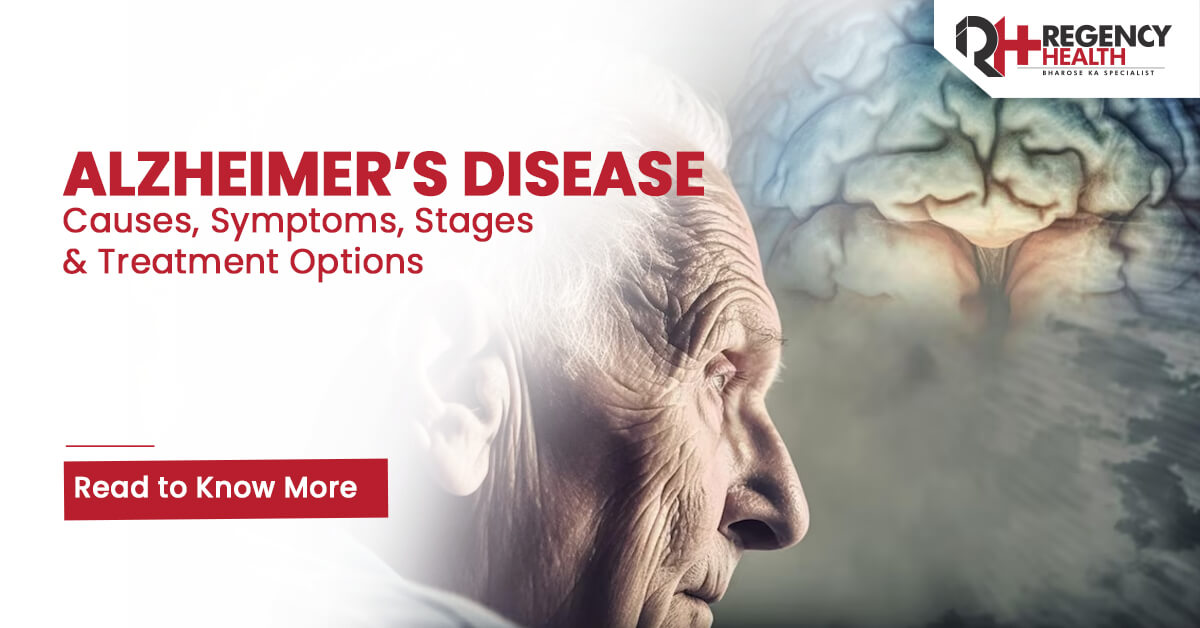Alzheimer’s Disease: Causes, Symptoms, Stages and Treatment Options

Alzheimer’s disease is a neurological condition that destroys neurons and synapses, impairing memory and cognitive function. Alzheimer’s disease also causes a deterioration in several behavioural and social abilities. The early stages of Alzheimer’s disease typically begin in a person’s 60s and last for the remainder of their lives. If Alzheimer’s is not treated in the early stages, it frequently develops into dementia and can be fatal.
Alzheimer’s is named after German physicist Dr. Alois Alzheimer, who first noticed the alterations in a woman’s brain tissues after she passed away in 1906 from an unexplained mental disorder. The woman exhibited several symptoms, including speech problems, memory loss, and erratic behavior—all of which are now recognized as signs of Alzheimer’s disease. One of the best strategies to fight Alzheimer’s disease is early identification, which can also significantly improve the patient’s quality of life.
Alzheimer’s Disease Causes
It is unclear what causes Alzheimer’s disease exactly. However, it is commonly believed that brain proteins don’t work normally on a fundamental level. This malfunction impacts the functioning of neurons and causes a chain reaction. Damaged neurons stop communicating with one another. According to researchers, Alzheimer’s disease results from a confluence of hereditary, dietary, and environmental factors and impacts the brain over some time.
Alzheimer’s Disease Symptoms
Memory related
The primary symptom of Alzheimer’s disease is memory loss. Facing a challenge in recalling conversations and recent happenings is another prime symptom. But as the illness worsens, memory declines, and additional symptoms appear.
Other memory-related symptoms include
- Repeating questions and phrases.
- Not remembering meetings, events, or conversations.
- Misplacing items at irregular places.
- Facing confusion in familiar areas
- Not remembering the names of their loved ones and common items.
Reasoning
Concentration and analytical problems are other common symptoms of Alzheimer’s disease, especially when it comes to abstract ideas like numbers. Patients find it tough to manage multiple tasks at once along with handling money, keeping checkbooks balanced, and making on-time payments on bills. The ability to use numbers and comprehend their value may also be impacted.
Other Symptoms
- Depression
- A decline in motivation for activities
- Social exclusion
- Mood changes
- Mistrust of other people
- Anger or hostility
- Wandering Away from home
Stages of Alzheimer’s Disease
Stage 1: Mild Alzheimer’s
The early stages of Alzheimer’s showcase mild cognitive impairment. It results in the depletion of memory and reasoning skills. In this stage, the patient is still capable of functioning independently and engaging in activities like driving, interacting normally in social settings, and carrying out a variety of everyday tasks without much assistance.
Stage 2: Moderate Alzheimer’s
The second stage of Alzheimer’s is typically the most prolonged one and calls for urgent attention to stop it from getting worse. At the moderate level, people need some support to accomplish everyday duties including driving, cooking, and cleaning. People may feel irritated and irritable at this point, and they frequently forget their most basic personal information. Alzheimer’s patients frequently forget what day it is, where they are going, and even what their name is.
Stage 3: Severe Alzheimer’s
At this stage, Alzheimer’s disease signs can be extremely upsetting to see. Patients completely lose awareness of their surroundings and recent memories. Additionally, they become unable to sit, walk, or even eat correctly. Patients frequently experience significant mood swings and showcase rage, despair, and paranoia. While some people may still be able to communicate clearly, others may have great difficulty expressing even the most fundamental feelings like sadness, joy, and suffering.
What is the best treatment for Alzheimer’s disease?
Treating Alzheimer’s symptoms early can help patients maintain their comfort, dignity, and independence for a long time. Medication such as cholinesterase inhibitors including galantamine, rivastigmine, and donepezil are recommended for Alzheimer’s symptoms that are mild to moderate. These medications could lessen or regulate some cognitive and behavioural problems. Acetylcholine is a chemical in the brain that is thought to be crucial for memory and thought, and cholinesterase inhibitors stop it from being broken down.
21st of September is observed as World Alzheimer’s Day to raise awareness of the disease and eliminate the stigma generally attached to it. Early detection of Alzheimer’s disease symptoms can aid in halting the progression of the condition and lead a normal life. Patients who exhibit any of the aforementioned symptoms are encouraged to get checked out right away at a multi super speciality hospital.

 Call-an-Ambulance
Call-an-Ambulance



